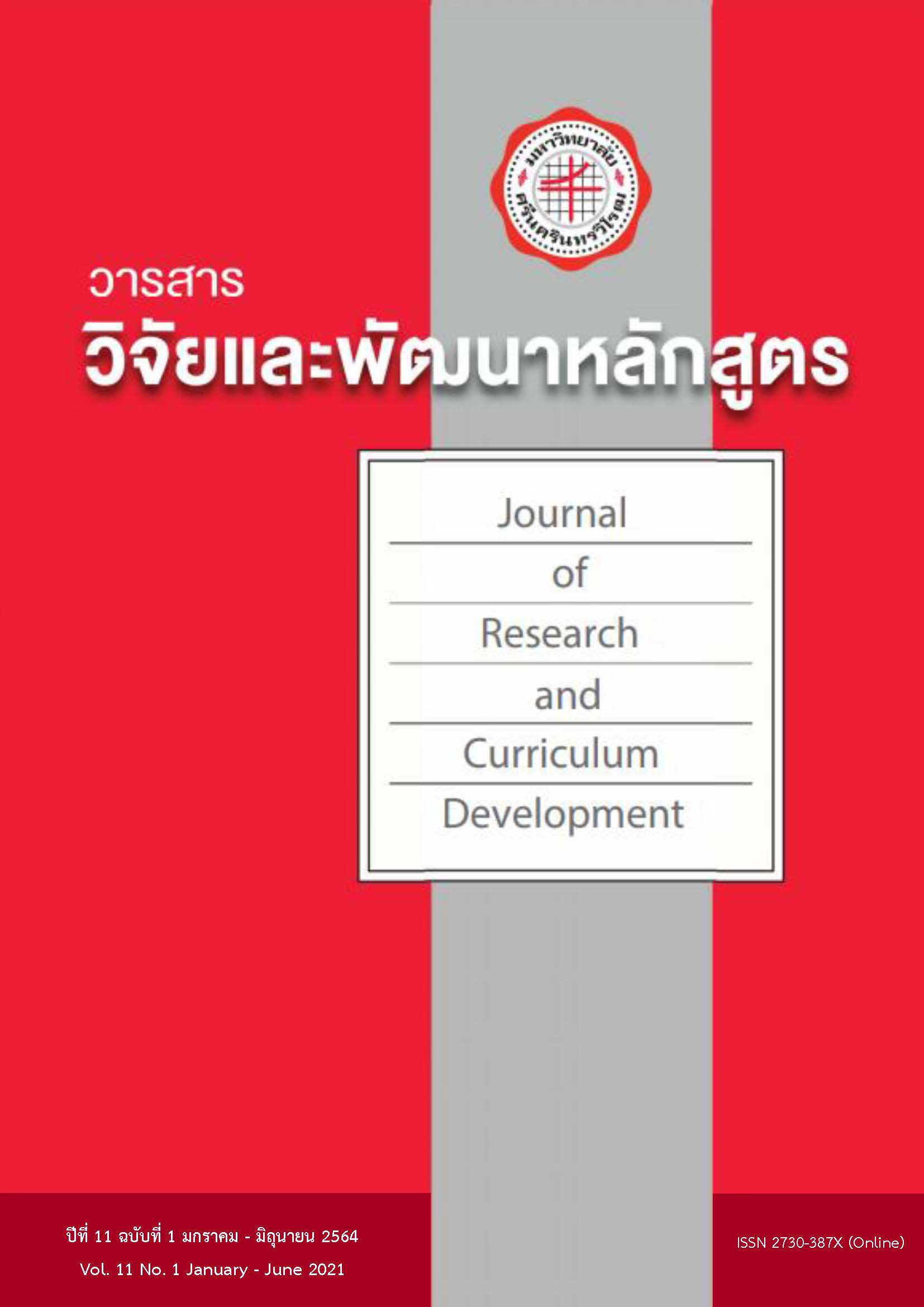การศึกษาแนวทางการบริหารจัดการหลักสูตรเพื่อส่งเสริมศักยภาพรายบุคคลในศตวรรษที่ 21 กรณีศึกษาโรงเรียนสาธิตสังกัดมหาวิทยาลัยระดับมัธยมศึกษา
Keywords:
Curriculum management, basic education, personalized learning curriculumAbstract
This research’s objectives are 1) to analyze and synthesize the principles/ concepts, theories, and findings of the curriculum management to influence the personalized learning in the 21st century: a case study of 3 university demonstration schools in the secondary level 2) to develop a guide to the curriculum management to influence the personalized learning in the 21st century: a case study of 3 university demonstration schools in the secondary level. Three curriculum leaders are selected from 3 best practices in secondary demonstration schools to join the structured interview. A qualitative methodology was employed for this research using the methods of documentary analysis and structured interviews and use content analysis to analyze the data. The findings show that 1) a guide to the curriculum management to influence the personalized learning in the 21st century consists of 4 steps, called EARN: (1) Engage & Enhance (2) Act & Access (3) Reflect & Reinforce and (4) Network & Naturalize 2) The EARN guide has trustworthy among the stakeholders. Teachers and students can support each other’s learning continually. Knowledge is integrated and used in the real world. It leads to a social innovator and life-long learner.
References
คณะกรรมาธิการนานาชาติว่าด้วยการศึกษาในศตวรรษที่ 21. (2540). การเรียนรู้ : ขุมทรัพย์ในตน แปลจาก learning : the treasure within. (ศรีน้อย โพธิ์วาทอง, และ และคณะ, ผู้แปล) กรุงเทพฯ: สำนักงานคณะกรรมการศึกษาแห่งชาติ.
ทิศนา แขมมณี. (2561). ศาสตร์การสอน องค์ความรู้เพื่อการจัดกระบวนการเรียนรู้ที่มีประสิทธิภาพ. กรุงเทพมหานคร: สำนักพิมพ์แห่งจุฬาลงกรณ์มหาวิทยาลัย.
ประกาศกระทรวงศึกษาธิการ เรื่อง มาตรฐานการอุดมศึกษา พ.ศ. 2561. (17 สิงหาคม 2561). ราชกิจจานุเบกษา, 135(ตอนพิเศษ 199 ง), 19-21.
พิมพ์พันธ์ เดชะคุปต์, และ พเยาว์ ยินดีสุข. (2557). การจัดการเรียนรู้ในศตวรรษที่ 21. กรุงเทพฯ: โรงพิมพ์แห่งจุฬาลงกรณ์มหาวิทยาลัย.
วิชัย วงศ์ใหญ่, และ มารุต พัฒผล. (18 มกราคม 2563). การโค้ชเพื่อพัฒนาศักยภาพผู้เรียน. เอกสารประกอบการอบรม. กรุงเทพมหานคร: บัณฑิตวิทยาลัยมหาวิทยาลัยศรีนครินทรวิโรฒ. เรียกใช้เมื่อ 3 มีนาคม 2563 จาก http://www.curriculumandlearning.com/?page=SpecialCoaching&language=th
สำเริง อ่อนสัมพันธุ์. (กรกฎาคม - ธันวาคม 2556). การบริหารหลักสูตรการศึกษาขั้นพื้นฐานในศตวรรษหน้า. วารสารบริหารการศึกษา มหาวิทยาลัยศิลปากร, 4(1), 216-226.
สำลี ทองธิว. (14 ธันวาคม 2562). การบริหารจัดการหลักสูตร. เอกสารประกอบการอบรม. จุฬาลงกรณ์มหาวิทยาลัย.
อรอุมา เจริญสุข, วัยวุฑฒ์ อยู่ในศิล, และ ภิรดี วัชรสินธุ์. (มกราคม-เมษายน 2558). แนวทางการพัฒนาและบริหารหลักสูตรการศึกษาขั้นพื้นฐานแนวใหม่. วารสารวิธีวิทยาการวิจัย, 28(1), 75-94.
อุบลวรรณ ส่งเสริม. (กรกฎาคม 2562). พื้นฐานการพัฒนาหลักสูตร. เอกสารประกอบการสอน. คณะศึกษาศาสตร์มหาวิทยาลัยศิลปากร.
Baeder, A. E. (2016). Tips for effective blended learning. Principal, 95(4), 24-25.
Glatthorn, A. A., Boschee, F., Whitehead, B. M., & Boschee, B. F. (2019). Curriculum Leadership: strategies for development and implementation (2 ed.). California, USA: SAGE publications.
Marshell, K. (2016). Rethinking differentiation-Using teacher's time most effectively. Phi Delta Kappan, 95(6), 30-34.
Print, M. (1993). Curriculum development and design (2nd ed.). Sydney: Allen and Unwin.
Skilbeck, M. (1984). School-based curriculum development. London: Harper and Row.
Trilling, B., & Fadel, C. (2009). 21st Century Skills: Rethinking How Students Learn (Leading Edge). San Francisco: John Wiley And Sons Inc.
Tucker, K. (2016). Classroom in focus. Principal, 96(2), 4.





